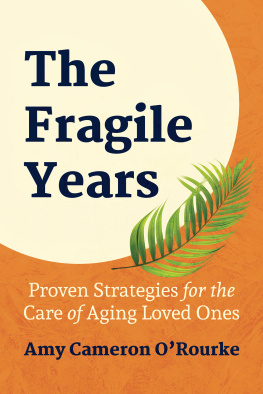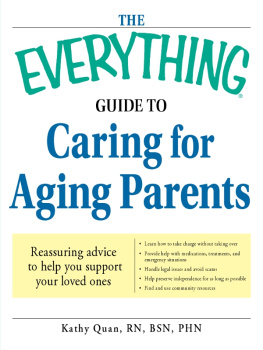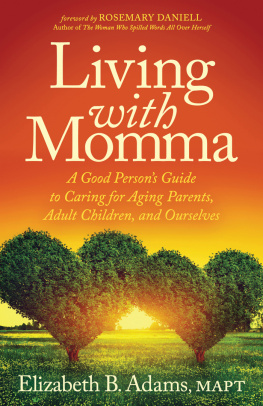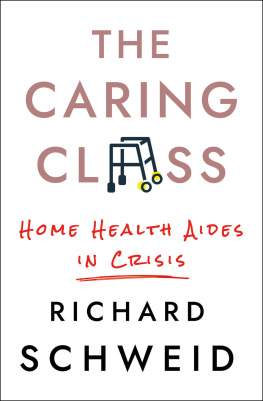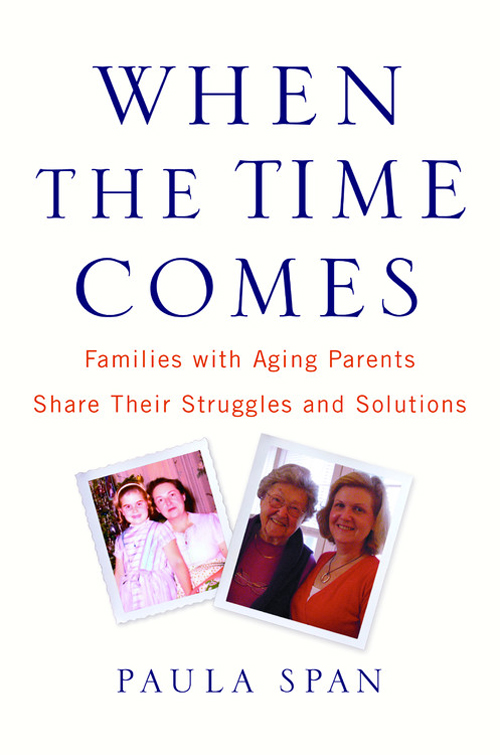Copyright 2009 by Paula Span
All rights reserved. Except as permitted under the U.S. Copyright Act of 1976, no part of this publication may be reproduced, distributed, or transmitted in any form or by any means, or stored in a database or retrieval system, without the prior written permission of the publisher.
Springboard Press
Hachette Book Group
237 Park Avenue, New York, NY 10017
Visit our website at www.HachetteBookGroup.com.
Springboard Press is an imprint of Grand Central Publishing. The Springboard name and logo are trademarks of Hachette Book Group, Inc.
First eBook Edition: June 2009
ISBN: 978-0-446-55222-6
For my parents, Ruth Kleban Span and
Murray Span, with gratitude
W AITING IN THE DIRECTORS OFFICE FOR OUR TOUR TO BEGIN, I noticed that my father had dressed for this occasion with some care. Hed added a sweater vest and bolo tie to his normal pants and polo shirt, and selectedfrom his sizable baseball cap collectiona blue one bearing the New York Mets insignia. He wore bifocals, and a hearing aid tucked into each ear, but with a recent haircut and this mornings close shave, he looked almost dapper.
Yet when I moved a bit nearer, I saw that his sweater was stained with food. You might want to put that vest in the laundry after today, Dad, I suggested carefully.
He shrugged. I didnt notice. He also didnt notice that his apartment, on the other side of town, was often dusty, the kitchen countertops spattered. A woman came to clean now and then, and he didnt see much point in paying her to come more often, because he couldnt see the dirt.
I admired the way hed put together a life since my mother died seven years earlier. He lived alone in an apartment building in southern New Jersey. He had good friends. He played cards a couple of nights a week, faithfully attended services and discussions at his synagogue, shopped and cooked (or defrosted, mostly) for himself. He was the guy who went out and bought the newspapers each morning for his neighbors who no longer drove. With prescriptions to keep his cholesterol and blood sugar in line, he was relatively healthy.
My sister and I proudly complained about how hard it was to reach him on the phone. Up and around! he always said, when we finally did. Keeping busy!
Yet how long could we be this fortunate? How long could he keep driving to the supermarket, handling his checkbook, remembering to take three or four different medications each day? Already, hed given up driving north to visit us; three hours via the Jersey Turnpike had become too tiring.
Sooner or later, we knew, he would need more help. Hed just turned 83 that fall. Somethingeyesight, heart, memorywas increasingly likely to fail. My mother had seemed fine, too, slowing but still engaged with life, until suddenly an exploratory laparoscopy found metastasized cancer, and we had to learn a lot in a hurry about hospice care.
Id been dreading the next phase ever since. Nobody wants to be facing these questions. We talk sometimes about a role reversal, the children becoming the parents, but its a flawed analogy. Our elders are not children; they dont have to do what we think best. Theres no t-shirt that proclaims, Because Im the Daughter, Thats Why. And this passage, unlike child rearing, will not result in eventual independence.
Still, we want to do the very best we can for the people who did the best they could for us. Looking ahead, I felt afraidbut I also wanted to understand, to feel prepared, to find a way to give my father comfort, security, dignity. His life may have begun winding down, but there could still be years of good times, friendships, laughs, and love ahead.
Maybe this assisted living facility place was where Dad would want to go, when the time came.
Our tour led past an outdoor courtyard, past the shop where residents could buy toothpaste and greeting cards. This sitting areas going to have a 45-inch television, the director announced with pride. You can watch a game together.
The Eagles have gotta do better this week, my father bantered back.
I was lucky, and unusual, in one respect: my parents had always been clear-eyed about their futures, willing to talk about care and costs and preferences.
Timing is the key to the whole thing, my father had announced earlier that morning, when we met for breakfast at Dennys. People wait too long to make these decisions, and then its decided for them.
So we mulled over some of the key questions again. For the cost of assisted living, I reminded him, we could probably afford enough home care to keep him in his apartment, at least for a while. But that didnt appeal to him.
One of the women in his buildingwhich gerontologists would call (I love this term) a NORC, a Naturally Occurring Retirement Communityhad been ill for a long time; an aide came in to help her every day. Once in a blue moon she gets out, but 90 percent of the time shes in the apartment, Dad reported.
To me, its like being in jail. To never see anyone or talk to anyone, it would drive me nuts. Hed rather be with people, having conversations, trading wisecracks. He provided a sample of his repartee: Hey, how ya doin? You dont feel good? Youre lucky you feel anything at all!
Yet however suitable an institution appears in glossy brochures, or sounds in abstract discussions, its often jarring to actually look at the place. Other assisted living apartments Id seen aimed for elegance. When my mother-in-law moved into a one-bedroom in Rhode Island, for instance, she arrayed her antique chairs and lamps around a spacious, carpeted living room, slept in her own four-poster, hung her favorite prints.
In this place, the furnished small room reminded me, instead, of a spartan college dormtiled floor, single hospital-style bed, unadorned desk and bureau, TV mounted on the wall opposite a recliner. The kitchen consisted of a microwave, sink, mini-fridge, and two cabinets. There was a bathroom with a walk-in shower, and a single clothes closet.
Thats the whole closet? my father said, alarmed by its narrowness. He had sport coats and ties he wore to synagogue, plus winter coats and boots, summer shirts. Id have to get rid of a lot of stuff. He could store his out-of-season wardrobe, the director said, but something about the closet brought home to my father how big a change he was contemplating.
The room made me uneasy, too. This particular assisted livingstate-supported and more affordable than manydidnt pursue the illusion of an upscale apartment building by substituting a concierge for a nurses station. It didnt put a premium on hominess. It was more honest, perhaps too honest: This is where you come when you are old and infirm, the room said. Well take care of you, but were not going to spend money on carpeting when theres a good possibility (the director quietly pointed out) of urine stains.
Later, the tour concluded, we sat on a bench outside the building, taking in the late fall sun, talking over what wed just seen. We were both chastened.
The only thing is, the closet will drive me insane, my dad said. I dont know how Id manage.
Why was he so fixated on the closet? It seemed harsh to point out that most people who move into assisted living dont go out very often, thus have less need for suits and coats. He was picturing his current self in this new place, I realized, not a diminished man who could no longer live alone.
Of course, it could be years yet before he needed assisted livingbut he could also have a health crisis and need a nursing home the following week. Uncertainty was built into the process.


